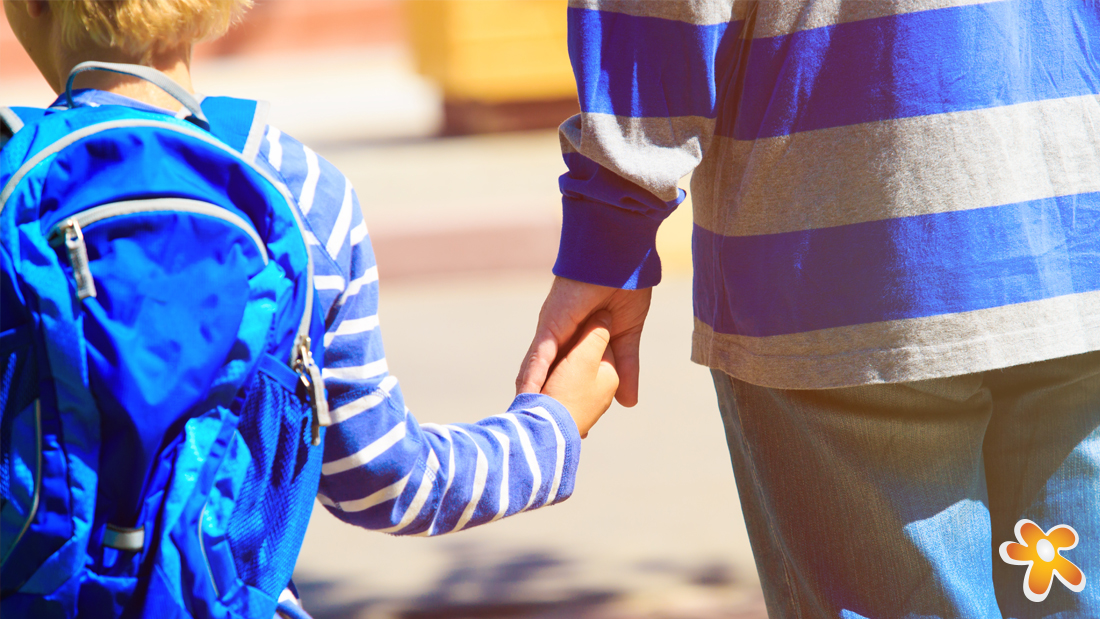Coping with Back-To-School Anxiety
It’s that time of year again! The time when everyone starts preparing for the Fall season, stores advertise big sales on school supplies, and families prepare to send their kids back to school. For some kids, going back to school comes with a lot of excitement. However, for many, preparing to go back to school comes with a mix of both excitement and new worries about the transition.
Helping Your Child Cope with Back to School Nerves
Occasional anxiety is a normal part of life, and for many, it can appear at various times (i.e. meeting new friends, studying for a test, starting a new activity). The start of the new school can be a time of heightened anxiety for kids. This anxiety can be present for even the most laid back and easy-going kids (and their parents)! Big transition years, such as starting kindergarten, switching schools, starting middle or high school, or friends moving away, can create even more anxiety for some children. Mixed emotions about returning to school, including excitement, sadness about summer ending, and anxiety about all the “what ifs” is normal.
Anxiety can present differently across different individuals, it may come with clinginess, verbalized worries, an increase in negative behavior, tantrums, irritability, withdrawal, or complaints of physical pains (i.e. stomachaches, headaches). For most kids, the anxiety will be short-lived and fade as the school year carries on and the child/adolescent becomes more comfortable with the school routine. Still, it can be very helpful to have some skills and strategies in place to help with this possibly nerve-racking transition. The most important thing for parents is to be supportive during this time of transition and create a safe space for their child/adolescent to express any concerns.
Below are some general ideas followed by more specific suggestions to consider if you notice your child is having some worries or anxiety about the school year starting:
Establish routines
Make sure your child is getting sufficient sleep, eating regular meals, and engaging in regular activity or physical exercise. It can be helpful to start routines that will easily transition across the school year to ensure that your child is getting good sleep and nutrition in order to feel the best that they can feel. Our minds and bodies are very connected, and so if your child is physically feeling well, he/she will have a better opportunity to cope with any anxiety that arises during the transition.
Listen to your child
If your child voices concern or worries, the most important thing you can do as a parent is listen to your child. Sometimes parents try to lower anxiety with the best intentions by downplaying a concern with a comment like, “Oh no, it won’t be that bad!” Try instead to not diminish or rush your child through their thoughts, concerns, or worries. Instead, show them that you are listening by repeating main concerns and providing empathy around specific concerns with something like, “Oh, so you’re nervous about the types of quizzes and tests you might have in third grade.”
Encourage problem-solving skill development
Once you have identified worries or concerns, help your child consider possible plans or actions that they can do to lessen their worries. It’s important that parents encourage children to consider ideas prior to suggesting their own thoughts or possible plans. This might include saying something like, “So if you don’t have any of your friends to sit with at lunch, what could you do?” This encourages your child to practice developing independent problem-solving skills and allows room for coaching when needed. It might also be helpful to encourage your child to think of a “Go To” person to talk to when your child needs help problem-solving when at school.
Monitor your own mood and actions
Pay attention to your own language and behavior. Sometimes anxiety can be contagious, and kids take cues from their parents! It is important for parents to be aware of their own actions or words since those can influence your child’s mood or anxiety level. Figure out what you need to do (i.e. increase coping, talk to someone, increase physical activity) to stay calm and model good coping. In addition, this allows you as a parent to highlight and prompt your child to consider all the positive aspects they might be excited about with school starting!
More concrete strategies to use during the start of the school year:
- Go through the school routine prior to school starting, including driving or walking the school route.
- If your child is younger, spend some time playing on the school playground before or just as school starts to allow them to become more familiar with it.
- Plan school outfits or lunches ahead of time to avoid morning stress.
- Empower your child with offering choices to give them a sense of control: would he like this transportation option or that one, this breakfast or that breakfast, etc.
- If your child is older, allow her to participate in the conversation around what will after school hours look like by asking what she would prefer regarding homework times and other after-school activities.
- Consider scheduling play dates or get-togethers with familiar peers as the school year starts since interactions with familiar people can improve both academic and social adjustment.
If your child continues to struggle with managing worries past the first couple of months of the year, and it appears to be causing a great distress for your child, relationships, or his ability to function (i.e. grades are being affected, school is being avoided), it might be appropriate to seek additional support. This might be achieved by simply speaking to a school counselor for additional insight or suggestions, discussing your concern with your child’s pediatrician, or identifying a behavioral health therapist in the area who might be able to evaluate the situation and help your child develop skills and strategies to manage his anxiety.
Resources: ChildMind.org | Anxietybc.com
Coping with Back-To-School Anxiety
Dr. Catherine Funk, PhD
Catherine Funk is a licensed psychologist who specializes in working with children and adolescents. Dr. Funk received her doctorate in school psychology from the University of Texas at Austin. She completed her doctoral psychology internship at Boston Children’s Hospital/Harvard Medical School, followed by a postdoctoral fellowship at the Texas Child Study Center/Dell Children’s Medical Center. Dr. Funk specializes in providing evidence-based treatments for children and adolescents coping with chronic or acute illnesses, anxiety, and/or depression. She utilizes behavioral approaches to manage disruptive or challenging behavior and has experience with various family therapy models to assist with positive change. Dr. Funk has experience in formal assessments of children and adolescents with a wide range of developmental, behavioral, and academic concerns (e.g., ADHD, learning disabilities, anxiety, and mood disorders).
Want to know how a Therapist can Help?
Call (828) 398 0043 or click on the schedule button.



